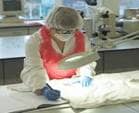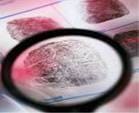Introduction
Forensic sciences or forensics is the application of various scientific methods and principles to investigate criminal and civil actions which are of interest to the legal systems. All the clues collected from a crime scene are analyzed by forensic scientists in a crime laboratory and are converted into evidences worth producing in legal courts.




Forensic Science is essentially a crime laboratory-based profession; the course qualifies students to apply their knowledge of science to the investigation of crime. One can arbitrarily divide forensic science into three broad groups: medical, laboratory, and field services. These are not exclusive divisions and there may be overlap between divisions. Furthermore, a number of different forensic disciplines may be involved in the investigation of a case depending on the type of evidence detected at and recovered from a scene.
The forensic scientist's role in the civil justice arena is expanding. Issues range from questions of the validity of a signature on a will, to a claim of product liability, to questions of whether a corporation is complying with environmental laws, and the protection of constitutionally guaranteed individual rights. Forensic scientists analyze all physical evidence found on a victim on the scene of a crime and compare it to evidence found on a suspect and provide expert testimony in a court of law. The evidences might include traces of blood, saliva, other body fluids, hair, fingerprints, footwear and tyre impressions, explosives, specimens of tissue for poisons, blood and urine for alcohol etc. Their expertise lies in the determination of facts using these evidences. They have to prepare a report of their investigation and appear in the court to give evidence. They work closely with the police to provide scientific evidence that is admissible in the court.
Field sciences may include crime scene investigation that incorporates areas such as fire and explosion scenes and secret drug laboratories. Examples of medical services are pathology, psychiatry, psychology, forensic medicine and dentistry. Laboratory services include chemistry, biology, toxicology, ballistics, fingerprints, questioned documents and marks and impressions.
There are various subdivisions of forensic sciences, they are:
• Forensic archeology
• Forensic biology
• Forensic economics
• Forensic engineering
• Forensic epistemology
• Forensic linguistics
• Forensic psychology
• Forensic serology
• Forensic anthropology
• Forensic computing or digital forensics
They can find employment with
• Law enforcement agencies.
• Police
• Legal system. Investigative services of the government.
• Private detective agencies.
• As teachers in institutes that conduct courses in this subject.
• Forensic labs
• Opportunities for forensic scientists exist in government organizations such as the Intelligence Bureau (IB), the Central Bureau of Investigation (CBI)
• Federal Agencies
FAMOUS PERSONALITIES
Dr. Bass is one of the nation's leading forensic scientists, assisting with hundreds of cases for the FBI and other law enforcement agencies in his career. He will speak about actual crime scene investigations occurring right here in Anderson County and the surrounding region, focusing on how forensic science plays a key role in solving crimes. Dr. Bass was one of the most popular lecturers on the 2004 Summer Science Series lineup and agreed to return at the request of many of the attendees to focus in on some of the most challenging and memorable cases in this area.
Dr. Bass has written or co-authored more than two hundred scientific publications. The Body Farm, officially known as the University of Tennessee's Forensic Anthropology Research Facility, was created by Dr. Bass in 1972. This outdoor laboratory is now home to hundreds of skeletons and enables students and professional forensic anthropologists to learn more information about the human-decomposition process.
Georg Popp is credited as the first forensic scientist to utilize geological evidence to solve a crime. Subsequently there have been significant advances in the theory and practice of forensic geoscience: many of them subsequent to the seminal publication of "Forensic Geology" by Murray and Tedrow In October 1904, while working as a forensic scientist in Frankfurt, Germany, Georg Popp was asked to assist in solving the murder of a young woman named Eva Disch, who had been strangled in a field. The murder weapon was Ms. Disch's scarf, and the perpetrator had apparently left his own well-used handkerchief near the body. Upon microscopic examination of the contents of the handkerchief, Georg Popp noted that the enclosed mucous contained particles of snuff and bits of coal. The most forensically interesting aspect of the mucosal contents were a variety of minerals, particularly that of hornblende. Forensic geoscience has traditionally used established non-forensic techniques: 100 years after Popp's seminal work, research into forensic geoscience is beginning to lead, as opposed to follow other scientific disciplines.
Horoscope - Career for Zodiac Signs
If you are the one who loves adventure and want to take up a challenging career, then check out these sun signs which are in favour of forensic sciences
 Aries
Aries
 Taurus
Taurus
 Leo
Leo
 Libra
Libra
 Scorpio
Scorpio
 Capricorn
Capricorn
 Aquarius
Aquarius
 Pisces
Pisces
Eligibility : Click here for more information
Institutes : Some of the prominent institutions offering courses in Forensic Science can be had from the following links.. Click here for more information